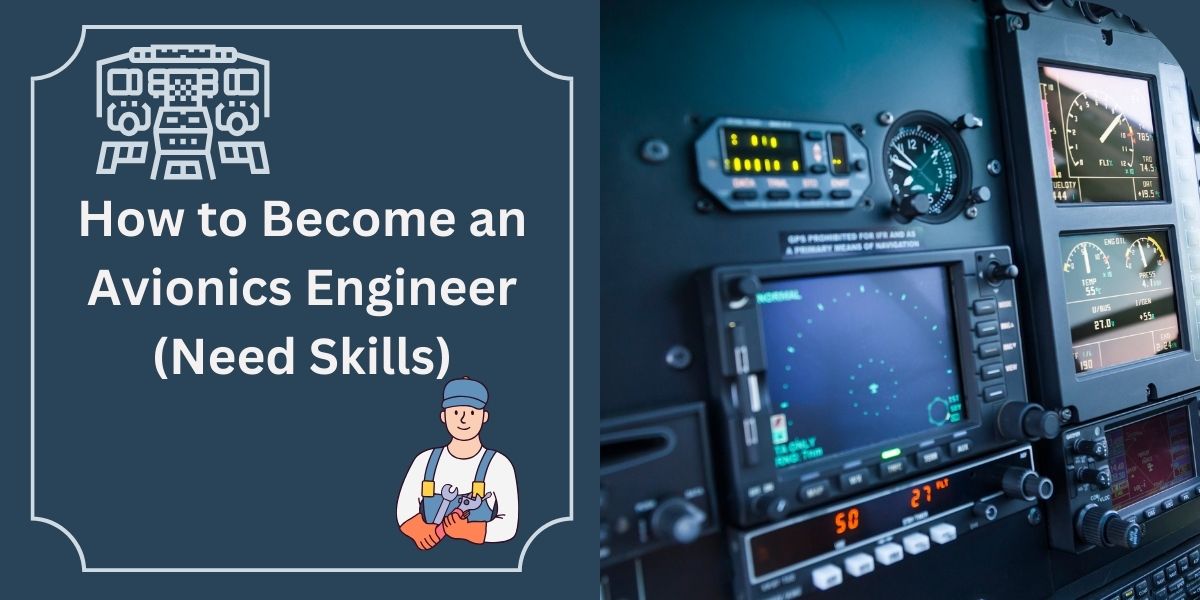Embarking on a journey to become an avionics engineer is an interesting field in the aviation industry. It requires a combination of education, technical skills, practical experience, and a passion for aviation.
Avionics engineers can also be called aerospace engineers, as they work in the aerospace industry, designing and developing aircraft, spacecraft, satellites, and missiles.
In this article, we will discuss how to become an avionics engineer, their duties, skills, and salary.
What is an avionics engineer?
An avionics engineer is someone who oversees the process of installing and maintaining the onboard electronics and instrument package of an aircraft or spacecraft.
This package is called the avionics system, which can be very complex and includes anything from navigation equipment to transponders and communication systems.
An avionics engineer uses their strong skills in electronics, computers, and math to accurately install and maintain many types of air and spacecraft systems.
What does an avionics engineer do?
In your role as an avionics engineer, there are some different duties that you may fulfill. Depending on what type of aircraft or spacecraft you are working with, the types of duties may vary slightly. Here are some of those duties:
- Conducting tests and inspections of the avionics systems
- Ensuring that all of the systems are functioning properly by conducting various tests and inspections
- Upgrading or replacing components when necessary
- Maintaining some logs for different aspects of the aircraft or spacecraft’s system to ensure it is performing correctly
- Designing new avionics systems for new aircraft or spacecraft
How to Become an Avionics Engineer
Here is a list of steps you can follow that may help you become an avionics engineer
1. Decide on an educational path
The first step to take if you’re interested in becoming an avionics engineer is to decide what type of education you would like.
While there are many routes you can take, such as obtaining a four-year degree or going through a graduate program, many engineers also gain experience on the job.
Degrees in electronics engineering and aerospace engineering are both immensely useful for this role, as they include many relevant courses.
2. Complete internships
Next, you can consider taking internships at various companies that offer avionics engineering jobs. This may help you find out if this job is the right career for you and build your experience and resume.
Internships with aerospace companies, such as NASA, can provide useful experience in the instrumentation of spacecraft. Internships at airplane producers, such as Boeing, may provide experience working with aircraft instruments.
3. Get licensed
After deciding you want to pursue this type of career, you can pursue licensure as an aircraft mechanic. To get this license, you can complete a training course and take an exam.
The exam requires you to speak, write, and read, as it includes both oral and written sections.
4. Apply for entry-level engineering or aircraft mechanic positions
Next, you can search for entry-level engineering or aircraft mechanic positions in your area.
Both types of jobs are useful, as they may help you gain more experience working on aircraft or spacecraft with highly trained teams. As you continue to develop your skills, you can pursue positions with greater responsibility.
5. Apply for higher-level engineering positions
After gaining some practical experience and building a resume, you can apply directly to higher-level engineering or aircraft mechanic positions and continue to build your career while learning more on the job.
At this point, you can apply for avionics engineer positions. Creating a resume that displays your qualifications for this important role.
Skills to Become an Avionics Engineer
Several technical and non-technical skills are important for avionics engineers to possess before working in the role. Here are descriptions of some of those skills:
- Mathematics: Mathematics skills are important for avionics engineers as they can use them to develop complex models and systems for instrumentation. As an avionics engineer, you may use mathematics for model development and to analyze aircraft systems. For example, you may use math to calculate the rate at which power is decreasing or increasing to determine if the batteries are performing correctly.
- Electronics: Electronics are an important skill to possess, as the work of avionics engineers includes electronic components like resistors, capacitors, and transistors. Knowing how these components work can help you design electrical circuits for aircraft or spacecraft.
- Systems analysis: As an avionics engineer, you may analyze an airplane’s performance. To do so effectively, you may have a good understanding of how different aspects of the aircraft, such as the engine and avionics system, work. Being able to analyze these systems can help you solve mechanical and electronic issues. And design an airplane that is more efficient while also facilitating communication between different onboard systems.
- Project management: This skill is necessary for an avionics engineer to be successful, as they may manage several projects and deadlines. Project management skills can help you organize your time and resources effectively. So that you give yourself enough time to complete a project on a tight deadline.
- Communication: As an avionics engineer, you may communicate with many different types of professionals, including team members, stakeholders, and customers. To successfully communicate, you may have strong oral and written skills and the ability to convey complex ideas effectively.
How Much Does an Avionics Engineer Make?
The average annual pay for an avionics engineer in the United States is $111,304 a year. That works out to be approximately $53.51 an hour. This is the equivalent of $2,140/week or $9,275/month.
While ZipRecruiter is seeing annual salaries as high as $169,500 and as low as $49,000, the majority of Avionics Engineer salaries currently range between $87,500 (25th percentile) and $136,500 (75th percentile), with top earners (90th percentile) making $158,000 annually across the United States.
The average pay range for an Avionics Engineer varies greatly (by as much as $49,000), which suggests there may be many opportunities for advancement and increased pay based on skill level, location, and years of experience.
Job Description of an Avionics Engineer
Avionics engineers specialize in designing and developing avionic instrumentation for aircraft and spacecraft, addressing flight safety, landing gear, and navigation systems. They work closely with aviation technicians to install, test, and maintain electronic systems.
Engineers adapt existing components and develop new ones, considering factors like weight limitations and environmental conditions.
Specialization in areas like radio equipment or flight control systems is common, with engineers staying updated through reading, seminars, and courses. They often work in teams, keeping detailed records and producing technical reports for management.
Conclusion
Preparing for a fulfilling career as an avionics engineer requires dedication and perseverance. It involves pursuing a relevant degree, gaining hands-on experience through internships or co-op programs, obtaining professional certifications, and continually learning and networking within the industry.
By following these steps and honing your skills, you can work towards becoming a successful avionics engineer in the aviation industry.




 Jobi.ng
Jobi.ng




